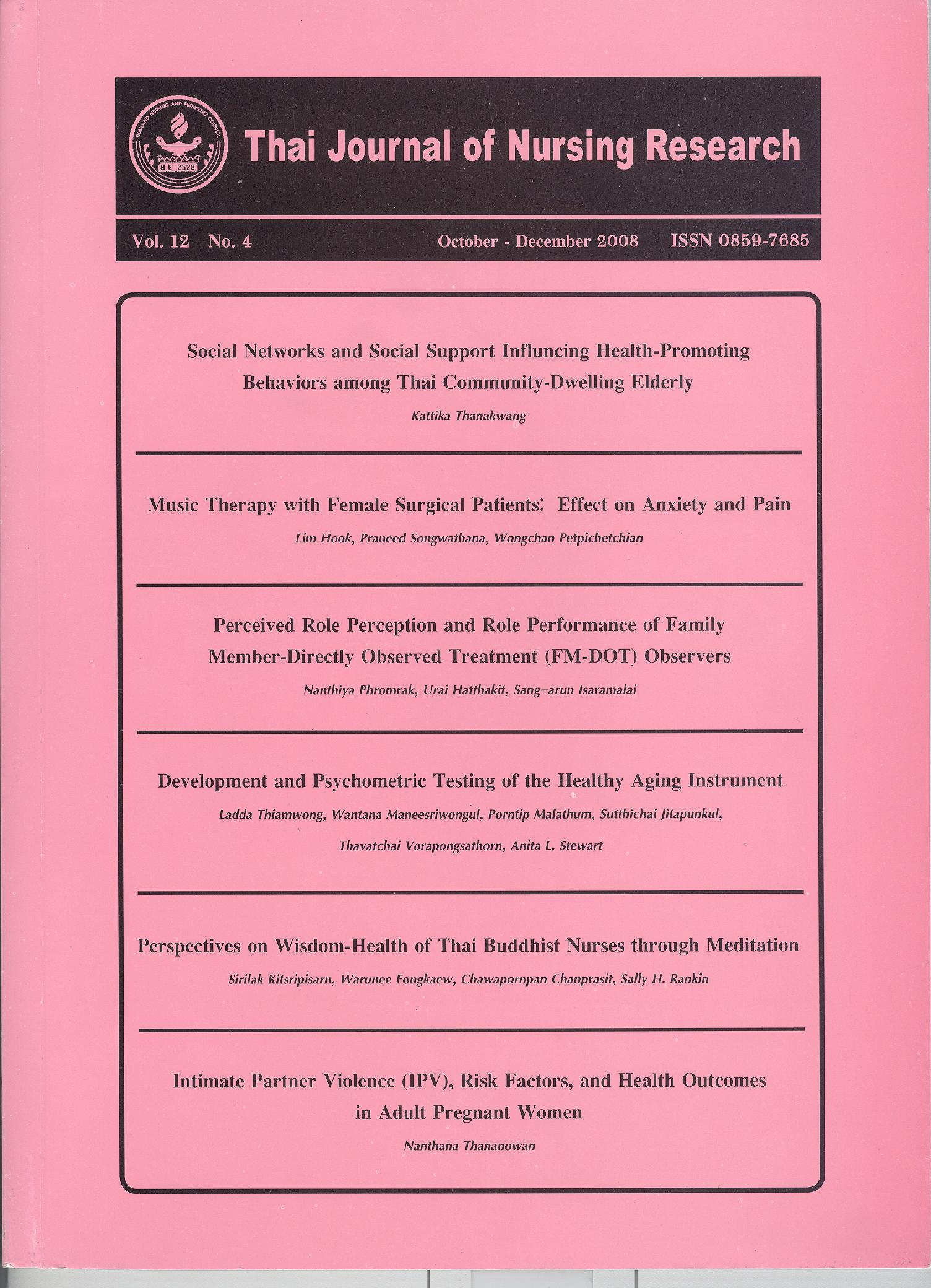Perspectives on Wisdom-Health of Thai Buddhist Nurses through Meditation
Keywords:
สุขภาพทางปัญญา, ปัญญา, ทัศนะของพยาบาลAbstract
บทคัดย่อ
การศึกษาวิจัยเชิงคุณภาพครั้งนี้มุ่งศึกษาสุขภาพทางปัญญาตามทัศนะของพยาบาลไทย ในประเด็นความหมายของสุขภาพทางปัญญา ลักษณะของผู้ที่มีสุขภาพทางปัญญา และความสำคัญของสุขภาพทางปัญญาที่มีผลต่อสุขภาพของคนไทย กลุ่มตัวอย่างที่ศึกษาเป็นพยาบาลวิชาชีพไทยที่มีการปฏิบัติกรรมฐานอย่างสม่ำเสมอ จำนวน 12 ราย คัดเลือกกลุ่มตัวอย่างแบบเฉพาะเจาะจงตามคุณสมบัติที่กำหนด ร่วมกับการส่งต่อโดยผู้ให้ข้อมูล (snowball sampling) ทำการรวบรวมข้อมูลด้วยวิธีการสัมภาษณ์แบบเจาะลึก ร่วมกับการสังเกต และการจดบันทึกเรื่องราว วิเคราะห์ข้อมูลตามเนื้อหาด้วยวิธีของสปราดเลย์ (Spradley)
ผลการศึกษาแสดงให้เห็นว่า ความหมายของสุขภาพทางปัญญาตามทัศนะของพยาบาลผู้ให้ข้อมูลหมายถึง การมีสติสัมปชัญญะ โดยสติจะเน้นในการรู้ตัว ระลึกรู้ และตั้งมั่นในปัจจุบัน ส่วนสัมปชัญญะเป็นการคิดใคร่ครวญตามหลักเหตุผล ที่สำคัญทั้งสติและสัมปชัญญะจะทำให้เกิดความเข้าใจในธรรมชาติของความจริงหรืออีกนัยหนึ่งคือ “ปัญญา” นำไปสู่การดำเนินชีวิตอย่างมีความสุข สำหรับลักษณะของผู้ที่มีสุขภาพทางปัญญาประกอบด้วย 1) อยู่อย่างผู้ใช้ปัญญา 2) มีคุณธรรมและจริยธรรมในชีวิต และ 3) มีความสุขสงบภายใน ส่วนความสำคัญของสุขภาพทางปัญญาต่อสุขภาพของคนไทยคือ การมีสุขภาวะจากความสามารถในการเลือกทางปฏิบัติแก้ปัญหาทางสุขภาพทั้งทางกายและจิตได้อย่างถูกต้อง รวมทั้งความเข้าใจในความจริงของธรรมชาติทำให้บุคคลมีความกรุณาต่อตนเอง เพื่อนมนุษย์และ สิ่งแวดล้อม ก่อให้เกิดสังคมที่สงบสุข
ผลของการศึกษาครั้งนี้ทำให้มีความเข้าใจอย่างถ่องแท้เกี่ยวกับสุขภาพทางปัญญาตามมุมมองของพยาบาลไทย นอกจากนี้ผลการวิจัยยังเป็นข้อมูลพื้นฐานในการพัฒนาแนวทางการประเมินสุขภาพทางปัญญาและให้การพยาบาลในมิติสุขภาพทางปัญญาแก่ผู้ใช้บริการ นำไปสู่การดูแลสุขภาพแบบองค์รวม
คำสำคัญ: สุขภาพทางปัญญา, ปัญญา, ทัศนะของพยาบาล
Abstract
The purpose of this qualitative study was to explore Thai nurses’ perspectives regarding the meaning of wisdom-health, the characteristics of persons who have wisdom-health, and the importance of wisdom-health to Thai people’s overall general health. Purposive and snowball sampling were used to recruit twelve Thai registered nurses who regularly practice meditation. Data were collected through in-depth interviews along with observation and ethnographic records. Data were analyzed using Spradley’s method of content analysis.
The main findings illustrated that the meaning of wisdom-health based on the perspective of Thai nurses is defined as having mindfulness (satti) and clear comprehension (sampajanna). Mindfulness focuses on being aware of, and reminding oneself to know and concentrate on the present moment, while clear comprehension means thinking reflectively on cause and effect. Both mindfulness and clear comprehension enable one to understand the nature of truth or “wisdom” so as to live with happiness. The characteristics of persons who have wisdom-health include 1) using wisdom to live their lives, 2) applying morality and ethical behavior to their lives, and 3) having inner peacefulness. Further, wisdom-health is crucial to the overall general health of Thai people because it helps them attain well-being by way of choosing the right means to solve their health problems both physically and mentally. Realizing the nature of truth leads people to be compassionate toward themselves, their fellow human beings and the environment, which, in turn, can contribute to a peaceful society.
The results of this study provide an understanding of wisdom-health from the perspectives of Thai nurses who practice meditation. Also, these findings could provide a foundation for developing guidelines, regarding assessment and nursing care related to wisdom-health, that lead to holistic care of clients.
Key words: wisdom-health, wisdom, nurses’ perspective, meditation
Downloads
How to Cite
Issue
Section
License
Copyright: The Pacific Rim International Journal of Nursing Research, Thailand Nursing & Midwifery Council has exclusive rights to publish, reproduce and distribute the manuscript and all contents therein.








.png)



